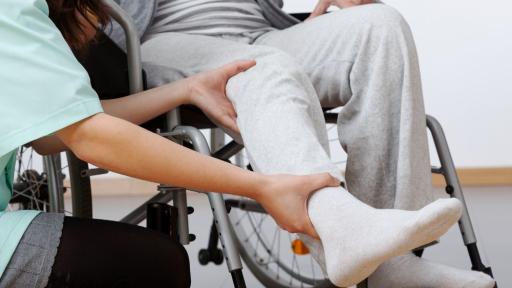Sativex (nabiximols) is the first cannabis-based medicine to be licensed in the UK. The drug can be prescribed for the treatment of MS-related spasticity when a person has shown an inadequate response to other symptomatic treatments, or found their side effects intolerable. Sativex can be used in addition to a person's current anti-spasticity medication.
Prior to gaining a licence for use in MS-related spasticity, Sativex had been studied for its effects on a number of MS related symptoms including: pain, bladder symptoms, tremor, and sleep disturbance.
Sativex is a mouth (oromucosal) spray containing two chemical extracts derived from the cannabis plant: delta-9 tetrahydrocannabinol (THC) and cannabidiol (CBD). The number of sprays is gradually increased each day until the optimum dose is reached. This can take a few days or up to two weeks. The number of sprays needed varies between different people. The idea is to find the right number of sprays for you, which gives you good relief from your muscle stiffness but with the fewest side effects.
Side effects and contraindications
Common side effects include dizziness, drowsiness, constipation or diarrhoea, fatigue, memory or concentration problems, and a dry mouth or changed sense of taste. These side effects are more likely when you first start treatment and usually wear off within a few days. Speak to a health professional if you experience side effects as there may be steps you can take to minimise them.
Sativex is not recommended for pregnant women and people under 18 years old. People with a history of psychotic problems should not take the drug.
Driving and using machines
Sativex may impair the mental and/or physical abilities required for certain potentially hazardous activities such as driving a car or operating machinery. Driving or using machinery when you first start taking Sativex is not recommended until you are established on a stable daily dose.
If you experience any significant side effects once you've established a stable dose, you should not drive, operate machinery or take part in any activity that could prove hazardous.
If you are concerned about the rules around drug driving for people taking prescription medications like Sativex, speak to your health professional. There is also information on the GOV.UK website.
A study in 2018 looked at the effects of Sativex on driving ability in people with MS. It found that, if side effects such as dizziness and drowsiness were not experienced, Sativex did not impair driving. They found no evidence of an increase in motor vehicle accidents associated with taking Sativex. The majority of people in the study reported improvement in driving ability; this was thought to be because of reduced spasticity.
Sativex is a licensed treatment and can be prescribed legally in the UK, but NHS prescribing remains very limited and varies across the country. An MS Society report published in August 2021 has highlighted barriers to accessing Sativex across the UK.
-
The NICE guideline on cannabis-based medicinal products recommends that, providing the local NHS health authority (integrated care system, or ICS) is willing to pay for continued treatment, a 4-week trial of Sativex can be offered to people with moderate to severe MS-related spasticity which has not improved while taking other treatments. At the end of the trial, if their spasticity-related symptoms are reduced by at least 20%, they can continue taking Sativex.
Despite this recommendation, many people in England who meet the medical criteria are unable to try Sativex because the local ICS is not willing to pay for continued treatment. There are multiple reasons for this: the ICS may not have revisited local funding decisions in the light of the 2019 NICE guideline; the ICS may not agree with the NICE assessment of cost-effectiveness; the positive impact that small improvements in spasticity symptoms can have on care and quality of life for people with MS and their carers may not be recognised; in many areas of England, there is a lack of appropriate pathways for assessing spasticity or handing over responsibility for prescribing Sativex from hospital consultants to GPs.
ICSs publish decisions about funding of medicines in an online drug formulary; contact your ICS for information about local drug formularies.
-
Sativex has also been recommended as a treatment option within NHS Wales for moderate to severe spasticity in people with MS who haven't responded to other anti-spasticity medication.
-
Sativex has been accepted for use in Scotland by the SMC (Scottish Medicines Consortium) from September 2022. The same criteria for use apply as elsewhere in the UK.
-
In Northern Ireland, Sativex has been accepted for use as a treatment option (search for Sativex) for people with moderate to severe spasticity who have not responded well enough to other treatments.
Limited access to Sativex on the NHS means that some people decide to obtain a private prescription and pay the full cost of the drug themselves. This can be an expensive option and is therefore not feasible for everyone.
As Sativex is cannabis-based, it is a controlled drug. Controlled drugs are given a Class (A, B or C) which reflects their potential for harm and the legal implications for inappropriate supply and possession. They are also given a Schedule which indicates how it can be prescribed and stored.
Sativex is a Class B controlled drug under the Misuse of Drugs Act 1971 and is placed in Schedule 4 to the Misuse of Drug Regulations 2001.
As Sativex is placed in the less-restrictive Schedule 4, this means that it can be prescribed legally in the UK with no restrictions on supply, recording, storage or destruction. It can only be prescribed by a specialist doctor with experience of treating MS spasticity – consultant neurologists, consultant rehabilitation specialists and consultant pain specialists.
Use of Sativex is currently limited to those people who respond to the first four weeks of treatment. If there is no clear improvement in spasticity-related symptoms, treatment is stopped.
In November 2018, the legal status of cannabis was amended to allow specialist clinicians to legally prescribe cannabis-based medicinal products to people with an exceptional clinical need.
Clinical trials have shown that Sativex is an effective treatment for MS spasticity. Since being licensed, a number of studies have been published more recently that analyse real-world data on Sativex. Studies have also investigated its potential to treat other symptoms.
One study collected real-world data from 30 MS centres in Italy and included 1,597 people with MS who had started treatment with Sativex for spasticity. The focus of the study was to look at how many people stopped taking Sativex and why. Researchers found that around 4 in 10 people stopped treatment either because it wasn’t effective (2.3 in 10) or because of side effects (1.6 in 10). The most common side effects were cognitive and psychiatric effects – including memory, cognition and attention problems, and panic attacks, hallucinations and depression – fatigue and drowsiness. This suggests that, although Sativex may help with MS spasticity for some people, it may not be effective or suitable for everyone.
Another paper analysed data from a registry which was set up following the approval of Sativex in the UK, Germany and Switzerland. Doctors that were prescribing Sativex were able to record data in the registry. It contains data from 941 people who were prescribed Sativex. The data shows that approximately 8 in 10 people benefited from treatment, 6 in 10 continued treatment and approximately 3 in 10 people stopped treatment because of lack of effectiveness or side effects. The most common side effects were dizziness and fatigue, and people were more likely to experience these during the first month of treatment.
Studies looking at the effectiveness of Sativex in treating neuropathic pain have been mixed. There’s currently with not enough high quality evidence proving that it’s effective in pain management.
-
Sastre-Garriga J, et al.
THC and CBD oromucosal spray (Sativex) in the management of spasticity associated with multiple sclerosis.
Expert Review of Neurotherapeutics. 2011;11(5):627-637.
Summary (link is external)
Novotna A, et al; the Sativex Spasticity Study Group.
A randomized, double-blind, placebo-controlled, parallel-group, enriched-design study of nabiximols (Sativex), as add-on therapy, in subjects with refractory spasticity caused by multiple sclerosis.
European Journal of Neurology 2011;18(9):1122-1131.
Summary (link is external)
Kavia R, et al.
Randomized controlled trial of Sativex to treat detrusor overactivity in multiple sclerosis.
Multiple Sclerosis 2010;16(11):1349-1359.
Summary (link is external)
Collin C, et al.
A double-blind randomized placebo-controlled parallel-group study of Sativex in subjects with symptoms of spasticity due to multiple sclerosis.
Neurology Research 2010; 32 (5): 451-459.
Summary (link is external)
Messina S, et al.
Sativex in resistant multiple sclerosis spasticity: discontinuation study in a large population of Italian patients (SA.FE. study).
PLoS One 2017;12(8):1-10.
Full article (link is external)
Patti F, et al.
Efficacy and safety of cannabinoid oromucosal spray for multiple sclerosis spasticity.
Journal of Neurology, Neurosurgery and Psychiatry 2016;87(9):944-951.
Full article (link is external)
Canadian Agency for Drugs and Technologies in Health.
Cannabinoid buccal spray for chronic non-cancer or neuropathic pain: a review of clinical effectiveness, safety, and guidelines.
Ottawa: CADTH; 2016.
Full article (link is external)
Celius EG, Vila S.
The influence of THC:CBD oromucosal spray on driving ability in patients with multiple sclerosis-related spasticity.
Brain and Behaviour 2018;8(5):e00962.
Full article (link is external)
Etges T, et al.
An observational postmarketing safety registry of patients in the UK, Germany, and Switzerland who have been prescribed Sativex (THC:CBD, nabiximols) oromucosal spray.
Therapeutics and Clinical Risk Management 2016;12:1667-1675.
Full article (link is external)

